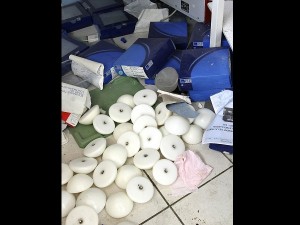Mixed advice in Europe over faulty breast implants

Equipments used to manufacture silicone gel breast implants are seen near boxes of breast implants, in the abandoned Poly Implant Prothese, P factory in La Seyne sur Mer, southern France, Friday, Jan. 6, 2012. France wants the European Union to stiffen its rules on authorizing medical devices amid a breast implant scandal involving a French company and affecting tens of thousands of women worldwide, the health minister said Thursday. The implants were pulled from the market last year in several countries in and beyond Europe due to fears they could rupture and leak silicone into the body. AP/Claude Paris
LONDON — European health authorities issued widely different recommendations Friday in dealing with potentially faulty French-made breast implants, with Germany and the Czech Republic following France in recommending their removal, while Britain insisted there isn’t enough evidence to suggest they should be taken out in all cases.
Germany’s Federal Institute for Drugs and Medical Devices said on Friday it was recommending the removal of PIP breast implants “as a precautionary measure,” while the Czech health ministry said about 2,000 Czech women with potentially faulty implants should have them removed.
But British Health Secretary Andrew Lansley said Friday that the U.K. had found no link between the implants — manufactured with non-medical grade silicone by the now-defunct French company Poly Implant Prothese, or PIP — and cancer.
However, his ministry said that silicone used by PIP “should not have been implanted in women in the first place,” and offered to provide examinations and possible removals — in instances where doctors say they are necessary.
Women in Britain who had PIP implants fitted for medical reasons — mainly former cancer patients — by the state-funded National Health Service, or women who used a private cosmetic surgery clinic which no longer exists would be offered an assessment, and could have the implants removed for free if doctors believed it necessary, Lansley said.
Britain’s NHS does not provide cosmetic surgery without a medical reason.
Lansley called on private medical centers to offer the same deal to patients who had paid for private sector cosmetic surgery.
“There is not sufficient evidence to recommend routine removal,” he said, but added that Britain believed “private health care providers have a moral duty to offer the same service to their patients that we will offer to NHS patients.”
Germany’s drugs and medical devices institute said that its new advice went beyond a Dec. 23 recommendation that women affected should have their implants checked for possible ruptures. It said the change followed new advice from experts who had warned that silicon from such implants can leak over time even if there is no rupture.
“How urgent a removal is in any given case depends essentially on how long the patient has carried the implant,” the institute’s chairman, Walter Schwerdtfeger, said in a statement.
The institute said it didn’t have information on how many women received such implants in Germany.
PIP’s website says the company exported to more than 60 countries and was one of the world’s leading implant makers. The silicone-gel implants in question were not sold in the United States.
France has said it will pay for some 30,000 French women to have their implants removed, after more than 1,000 ruptures of the PIP implants, which were pulled from the market in several countries in Europe and beyond due to fears they could rupture and leak silicone into the body. Colombia and Venezuela have made similar offers.
France’s Health Safety Agency says the suspect PIP implants appear to be more rupture-prone than other types. Investigators also say PIP sought to save money by using industrial silicone instead of medical silicone.
According to estimates by national authorities, over 42,000 women in Britain received the implants, more than 30,000 in France, 9,000 in Australia and 4,000 in Italy. Nearly 25,000 of the implants were sold in Brazil.
Australia’s medical watchdog, however, says health officials had found no evidence that the PIP implants had an increased risk of rupture in Australian women, and said lab testing of the silicone gel used indicated it was nontoxic to nearby tissue even if the implant did rupture.
Lansley said Britain and France were cooperating over the issue and planned to consult other European countries in the hope of preventing similar problems in the future.
In the Czech Republic — where the implants were banned in 2010 — the country’s health ministry said it would negotiate with the country’s health insurers on how to cover the cost of removals.
Those women who refuse to have the implants removed should undergo regular health checks, the ministry said in a statement. “No imminent risk of serious health problems has been proven,” the ministry said.
Associated Press Writers Karel Janicek in Prague and Geir Moulson in Berlin contributed to this report.